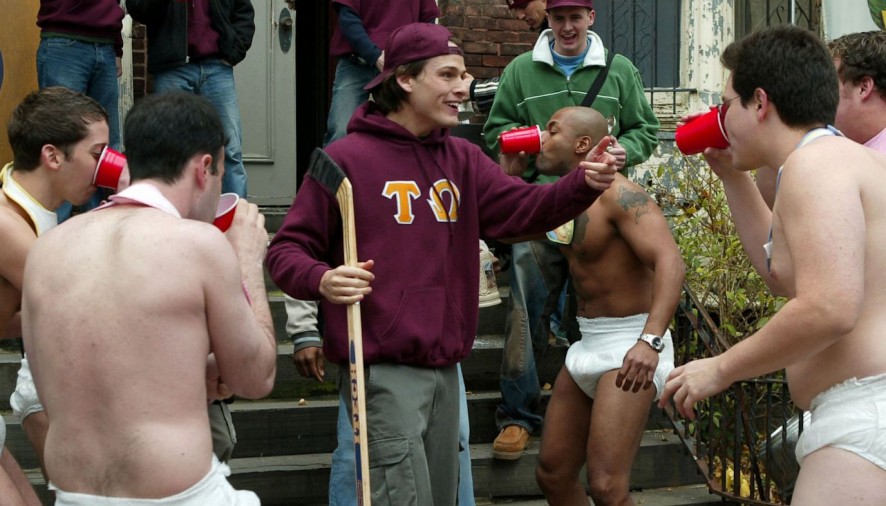Following shocking allegations involving Prime Minister David Cameron and a pig, The Gryphon explores society initiations and the long-lasting implications they can have.
Initiation rituals are usually a rite of passage and have been around for centuries occurring all over the world. These ceremonies, starting in tribes, have formed the very basis of many traditional practices and are conducted in many different ways. However, a branch of initiations with less cultural-standing is the student initiation: societies initiating newcomers with booze-filled games and challenges. ‘Hazing’ in America, ‘bastardisation’ in Australia, and ‘trote’ in Brazil, these practices are astoundingly popular amongst students today. Recently, it surfaced that even our very own Prime Minister appears to have partaken in an initiation ceremony for a certain elitist Oxford University society, although Cameron has since denied all claims.
The idea behind initiation rituals is perfectly understandable. By the end of the ceremony all the members of a society or group, regardless of background, wealth, gender, and so on, have a shared experience. The mentality is that, by participating alongside one another in an initiation, societies and their members can be brought closer together. So if it is simply a question of forming friendships and bonds, where do the dangers lie?
In recent years, this practice has become more violent and at times out of control. In a competitive culture, each society now feels that they have to not only initiate their newcomers but to also ‘out-do’ initiations of previous years. This results in anarchy, particularly amongst members of more competitive sports societies. Often, the initiation rules don’t take into account the different levels of individuals’ tolerance, with punishments being doled out to those who reach their limits first.
Unsurprisingly these extreme acts have seen three deaths in UK universities in the past decade. Alex Doji died aged just eighteen in 2003 at an initiation ceremony at Staffordshire University after choking to death on his own vomit, while, in 2006, eighteen-year-old fresher Gavin Britton died from alcohol poisoning after attending a golf initiation ceremony at Exeter University.
Such incidents have led to initiation ceremonies being declared as both banned and illegal. British law states that it is impossible in any circumstances, including initiation rituals, for someone to give consent to allow bodily harm or assault. Universities have also taken action regarding initiation rituals since such deaths, with individual students being banned from societies or expelled from the university, as well as societies themselves being shut down after running initiation ceremonies, or any socials for which the university may come under fire.
Here at the University of Leeds no one has to participate in an initiation ritual and can report any society for doing one. Leeds University Union’s Equality & Diversity Officer Gemma Turner said:
“The Union has a zero tolerance approach towards club or society initiations. Being a member of a club or society is a great part of student life at Leeds and it shouldn’t come with any pressure or harassment. We urge club and society committees to consider how initiations can make students feel uncomfortable and alienate members. If students do have any concerns about initiations, they can always chat these through with the Activities team, upstairs in the Union building, or our Student Advice team who are on hand to offer support.”
If they are considered dangerous and humiliating,why do students participate in them in the first place?
Mike Tinmouth, student officer in 2004 at the University of Southampton, conducted a student survey and found that just under a quarter of students surveyed had taken part in some sort of initiation ceremony despite the existing ban on the practice. Interestingly, the research further showed that there was support amongst the students who had taken them: initiation ceremonies were enjoyed and students felt a sense of achievement having survived them.
It is argued by supporters that initiation ceremonies are a necessary part of growing up and give freshers a sense of humility. They affirm that the majority of initiations are conducted safely, with fatalities occurring very rarely. There are many other threats that pose a greater risk to university students. In fact, by banning them it could potentially put students in more danger. Bans mean that initiation ceremonies may be unregulated and performed in secret and that it is only when someone gets hurts that the exact details of these ceremonies are exposed. However, considering the potential danger of unregulated ceremonies, perhaps it is time to finally expose these practices.
Please note that society initiations are and remain banned by the University of Leeds. If anyone has any concerns regarding initiation ceremonies or believe they have been put in danger, they should contact Leeds University Union on luuhelpdesk@leeds.ac.uk or call them on 01133801400.
Lindsey Fransman
Photos: abcnews

